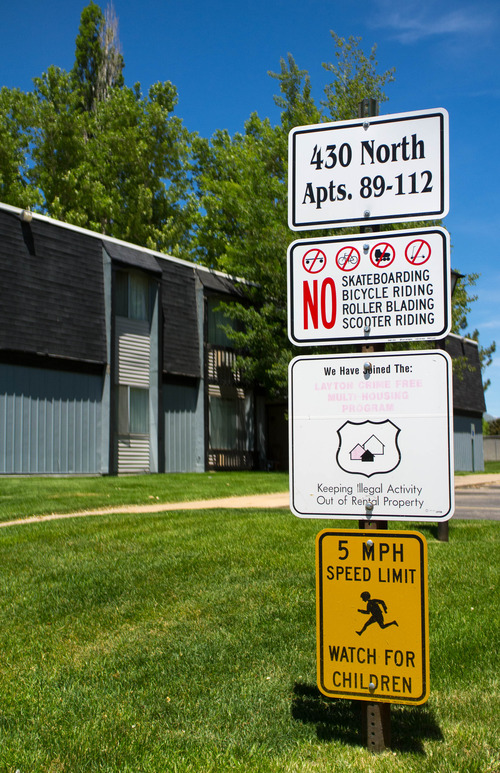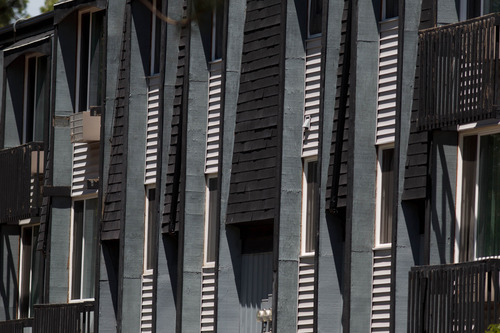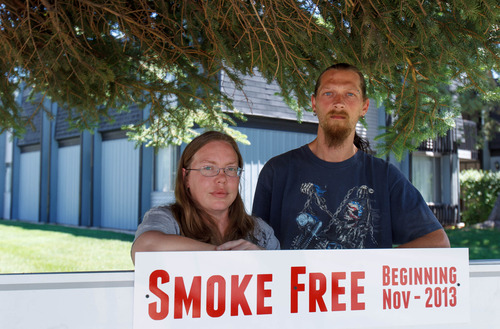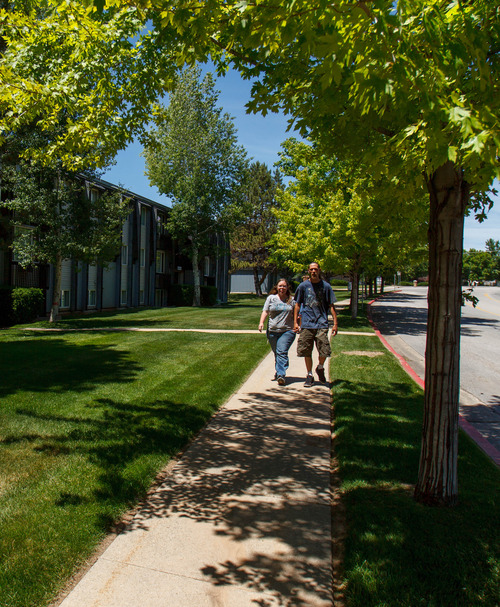This is an archived article that was published on sltrib.com in 2013, and information in the article may be outdated. It is provided only for personal research purposes and may not be reprinted.
In recent years, many of Utah's government-subsidized apartment complexes have adopted indoor smoking prohibitions. However, in Layton, one housing manager intends to install the nicotine ban across the entire property.
"We made a policy of 25 feet off our grounds, and our property ends one inch inside the sidewalk," Randy Banks, manager of the 111-unit Skyline View Apartments, told The Tribune.
In an April 29 notice, Banks informed his low-income renters that they can either quit smoking by Nov. 1 or find somewhere else to live.
"What smoke free means is that you can't smoke within 25 feet of the apartment property, which means sidewalks are not 25 feet away and the middle of the road won't work either!" the notice warned.
If both parties agree, the landlord-tenant contract that Banks proposes would be binding, said Layton City Attorney Gary Crane. However, the city would not cite someone for smoking on the sidewalk or street in front of the complex, Crane said.
Banks, who has managed the complex for 37 years, still mourns the recent death of one resident from lung cancer. And he vividly remembers the cigarette-caused fire that wiped out eight units several years ago.
With the backing of the Davis County Health Department and U.S. Department of Housing and Urban Development (HUD), Banks is moving forward to clear the air at Skyline View.
However, some view the all-out ban as a heavy-handed ultimatum.
"It's a bunch of BS," said 32-year-old Randy Batchelor, who has lived at Skyline View for eight years. Batchelor took up smoking at age 14 and acknowledged that he'd like to quit but lacks the willpower.
"You can't force someone to do something that they're not ready to do," Batchelor said, noting that he plans to start looking for other housing for himself, his fiancee and their two teenage children.
As early as 2009, HUD "strongly encouraged" public housing authorities to implement smoke-free policies. In Utah, several have done so.
"We've been transitioning to this for several years," Doug Carlson, executive director of the Provo City Housing Authority, said of the clean-air policies now in place within his city's 350 units.
To accommodate the smoking minority, Carlson said he installed sheds or gazebos on some properties where people could smoke and be protected from the weather.
"We've evolved from no policy to a semi-liberal policy to a very strict policy," Carlson said of the changes that started in 2001. Carlson said he never asks applicants if they smoke — and he's never evicted anyone for smoking inside.
"We establish the policy, and if they choose to live here, they must comply," Carlson said. "Some of our properties have designated gazebos for smoking, some do not" — based on spatial limitations and affordability.
According to Kerry Bate, director of Salt Lake County's Housing Authority, several properties have gone smoke-free, including the new 134-unit Bud Bailey Apartments for low-income refugees, homeless families and youth and people with disabilities.
"We have an area outside that is comfortable for smoking and is far away from the building," Bate said, adding that they met with tenants to make sure "they were in the driver's seat on these discussions."
Some winter-time infractions are expected, Bate said, and will not be grounds for terminating a lease. By significantly reducing indoor smoking, Bate said he anticipates saving about $1,500 in cleanup costs when a unit is readied for the next tenant.
The Utah Indoor Clean Air Act currently bans smoking within 25 feet of any entrance-way, exit, open window or air intake of buildings where smoking is prohibited. It also establishes the rights of owners, agents or proprietors to bar smoking anywhere on their premises.
Davis County's Health Department and board of directors wholeheartedly support such efforts to curb the impacts of secondhand smoke, said Community Health Educator Gloria Sawyer, adding that help is available for those smokers who are trying to quit."We've got about 64 percent of our communities that are smoke-free to one degree or another," Sawyer said. "But even within that percent, there are a variety of different interpretations."
Davis County also has enacted a law prohibiting smoking within 50 feet of outdoor amenities for apartment complexes such as tennis courts, swimming pools and playgrounds. Layton has its own ordinance against lighting up in parks and other public places, Crane said.
The notice that Banks sent to tenants gave them six months to "either change your habits or find another place to reside" and warned that apartment inspections will begin Nov. 1. In September, tenants will be asked to accept or reject the contractual change.
"
We hope everyone will come on board with this program and enjoy a fresher lifestyle," Banks said in the notice. "We will support those that have to quit in any way we can."
Skyline View tenant Pat Pearson, a smoker for about 40 years, recently wrote to HUD Secretary Shaun Donovan to voice her concerns.
"However well-intentioned, it will not make resident smokers quit," Pearson said. "They will more than likely have to find another complex, which directly places additional hardship on low-income people, who, if they had resources of their own, wouldn't require subsidized housing in the first place."
Andrew McCullough, an attorney from Utah County and former Libertarian candidate for state attorney general, balked at the ban.
" When the government tells us how big a soft drink we can have, and we can't smoke out in our yard, it seems to me it's gone too far in terms of Big Brother ," McCullough said. " We really need to take a deep breath and say that we can't be our brother's keeper — we can't make all the moral decisions for them."
Twitter: @catmck









